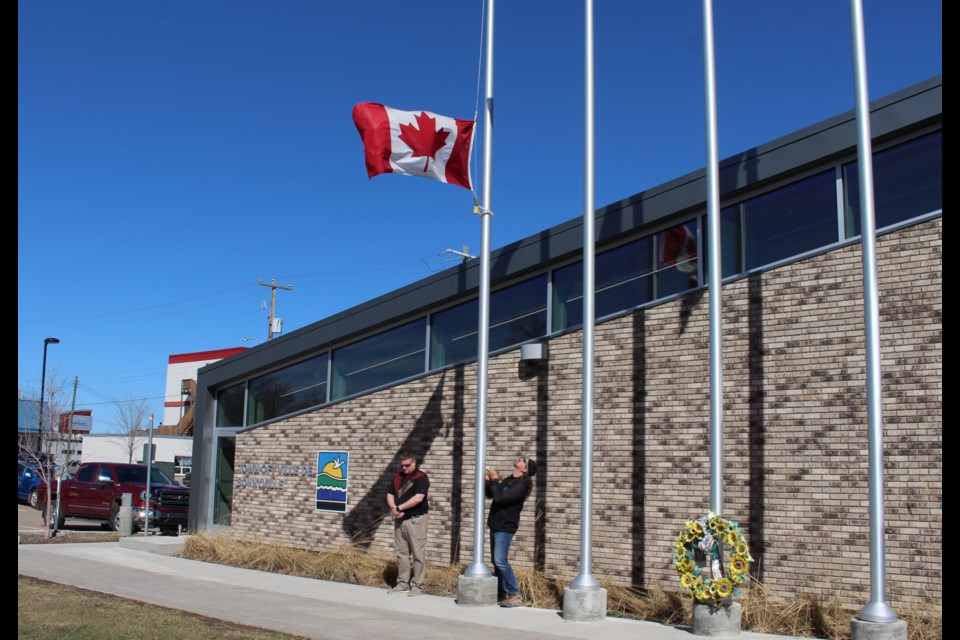BONNYVILLE – The National Day of Mourning ceremony held in the Town of Bonnyville’s council chambers started with a prayer by Rev. Charles Reid for those lost and maimed during a workplace incident, as well as the families and friends left behind.
“We often witness tragedies that do not make sense to us. Today we remember those who have been killed or injured in the workplace. These men and women are mothers and fathers, sisters and brothers, sons and daughters, friends and neighbours,” Reid prayed.
“As we remember the lost and injured, help each of us to commit to workplace safety and health so all places of work are free of unnecessary danger.”
Each year on April 28, the Town of Bonnyville along with many other municipalities across the country recognize April 28 as a day of mourning for all workers who have been killed, injured or disabled at their place of work.
The most recent data shows 1,081 workplace fatalities occurred across Canada in 2021, said Debora Martin, the Town of Bonnyville’s Health and Safety Manager, referencing data from the Workers Compensation Board (WCB).
Of those, 1,009 were male workers and 72 were female workers. Among those deaths were 18 young workers aged 15 to 24. In 2022, Alberta lost 161 people to workplace injury or illness, Martin listed.
“These stats only include what is reported and accepted by the Workers Compensation Board. There is no doubt that the total number of workers impacted is even greater,” she said.
“The National Day of Mourning is not only a day to remember and honour those lives lost or injured due to workplace tragedy but also a day to collectively renew our commitment to improving health and safety in the workplace and preventing further injuries, illness and death.”
Town of Bonnyville Mayor Elisa Brosseau followed by proclaiming April 28, 2023, as National Day of Mourning in the municipality.
Also, on hand to share a few words on the impact of workplace death and injury was Cold Lake First Nations Chief Kelsey Jacko and City of Cold Lake Mayor Craig Copeland.
“We have had incidents where some of our members didn't make it home after a shift from work. I felt that firsthand,” said Jacko. “It really affects a lot of people – community, family. It's sad [because] a lot of these deaths are preventable.”
The chief noted that the Day of Mourning ceremony is an important way to show the families and victims of workplace injuries that the community is here to support them.
“At the end of the day, you want them to go home to their family because they are loved, and they try the very best for the people that they support,” he added.
Copeland followed by pointing out the unique industries that put local workers at higher risk compared to other regions and why Occupational Health and Safety (OHS) needs to remain a top priority in the Lakeland.
“Our region is actually a pretty dangerous place when you look at all of the different activities up in Cold Lake with a fighter base (4 Wing), the oil patch and the farming and forestry industry,” he said.
This year, the City of Cold Lake received a Certificate of Recognition (COR), which shows that an employer’s health and safety management system has been evaluated by a certified auditor and meets provincial standards.
Copeland went on to note a significant fire that had taken place earlier that morning in the Hamlet of Cherry Grove. “Our hearts go out to those people at that church for a significant loss last night, but there were all the first responders that risked everything to try to put that fire out and they should be recognized,” he said.
Attending the ceremony were several first responders in uniform.
Wrapping up the ceremony prior to the lowering of the Canadian flag to half mast, emcee Tim Graham, the Business Manager and Senior Instructor for Astec Safety, shared his insights from years of working in the safety industry.
“One thing that people with these experiences don't often open up about is the secondary consequence of injury or death and the mental issues that follow. Losing a loved one is a traumatic experience, but the long-term consequences are often understated,” he said.
Graham’s message boiled down to one main thing: “An ounce of prevention is worth a pound of cure,” and “Let the legacy of those lost and injured be your safe choices.”
At 11 a.m. a moment of silence was observed.



